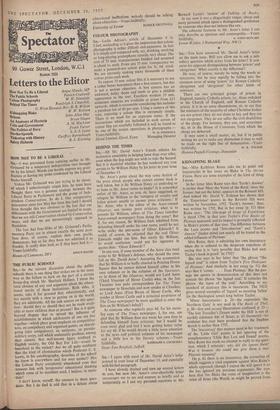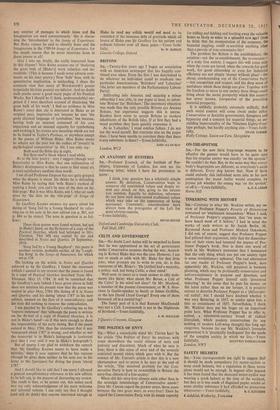KIDNAPPING BLAKE SIR,—Miss Kathleen Raine asks me to point out
inaccuracies in her essay on Blake in The Divine Vision. Here are some examples of the kind of thing I mean.
In her letter Miss Raine says that 'Earth's Answer' is earlier than 'Hear the Voice of the Bard,' since the former, but not the latter, appears in the Rossetti MS.
And indeed Mr. David V. Erdman has shown that the 'Experience' poems in the Rossetti MS were written by November, 1792. 'Earth's Answer,' then, was written by 1792. But in her essay (p. 51) Miss Raine says : 'The title-page of Songs of Experience is dated 1794; in that year Taylor's Five Books of Plotinus appeared, and its impact is promptly reflected in Blake's poems of that time. The difference between the Lyca poems and "Introduction" and "Earth's Answer" [italics mine] can nearly all be traced to the added influence of Plotinus.'
Miss Raine, then, is admitting her own inaccuracy when she is reduced to the desperate expedient of saying that it is 'very possible that Blake had seen Taylor's book in proof.' In 1792?
She also days in her letter that 'the phrase "the lapsed soul" is taken from Taylor's Five Dialogues of Plotinus.' And similarly in her essay (p. 51) she says that it 'comes . . . from Plotinus.' But the pas- sage she quotes in demonstration of this does not contain the phrase 'the lapsed soul.' It contains the phrase 'the lapse of the soul.' According to my standard of accuracy this is inaccurate. The NED gives several examples of 'lapsed' as meaning 'fallen' (in the theological sense) long before Taylor.
Minor inaccuracies : p. 20—the expression 'the Northern Gate' is not used in The Book of Thel; p. 30—first and second illustrations confused; p. 32— 'The lost Traveller's Dream under the Hill' is not of earthly existence but of Satan; p. 42 (footnote)—no evidence has ever been produced that the Daphne sketch is earlier than 1792.
The 'inaccuracy' that matters most in her treatment of the 'Little Girl' poems is her ignoring of the complementary 'Little Boy Lost and Found' poems. Miss Raine has made no attempt to reply to my ques- tion, which I reiterate : why did she ignore them? Was it because she could not give them a neo- Platonic meaning?
On p. 61 there is an inaccuracy, the correction of which suggests a vital argument against Miss Raine's whole approach (though I expect she will ignore it as she has ignored my previous arguments). She says here that 'for Blake the voice of imagination is the voice of Jesus (the Word), as might be proved from any number of passages in which Jesus and the Imagination are used synonymously.' She is discus- sing the 'Introduction' to the Songs of Experience. But Blake cannot be said to identify Jesus and the Imagination in the 1789-94 Songs of Experience, for ihe simple reason that he never mentions Jesus in those poems at all!
May I take up, finally, the really important issue in this dispute? Miss Raine accuses me of 'declaring the great bulk of [Blake's] work valueless and un- readable.' (This is because I made some adverse com- ments on his later poetry.) Now 'bulk' here, with its quantitative implication, is misleading. I share the common view that many of Wordsworth's poems (especially his later poems) are inferior. And no doubt such poems cover a good many pages of his Poetical Works. But I should be (I think, understandably) sur- prised if I were therefore accused of dismissing 'the great bulk of his work.' I find no evidence in Miss Raine's essay that she is interested in Blake as an original poet, impressive not because he uses 'the great classical language of symbolism,' but because, having both an unusual command of his own experience and an unusual capacity for symbolising and evoking it, he creates new meanings which are not to be found in Taylor's Plotinus, or anywhere except in the poems of William Blake. Miss Raine seems to admire not the poet but the author of 'essay(s) in mythological composition' (p. 46). I can only say : Both read the Bible day & night, But thou read'st black where I read white.
As to the later poetry : may I suggest (though very tentatively) to Miss Raine, that one explanation of Blake's development is that he came to find visual art a more satisfactory medium than words.
I am afraid Professor Empson has not quite grasped what the dispute is about. He thinks he is defending Miss Raine by saying that 'with Blake's method of making a book, you can't be sure of the date on his title-page.' But it was Miss Raine, not I, who set such store by 'the date on the title-page' of Songs of Experience.
Sir Geoffrey Keynes answers my query about his dating of 'Song 2nd by a Young Shepherd' by refer- ring me to his note in his new edition (on p. 885, not p. 884 as he states). The note in question is as fol- lows: These three poems were found written, but not in Blake's hand, on the fly-leaves of a copy of the Poetical Sketches, which had belonged to Mrs. Flaxman. This MS was copied by me and described in Notes and Queries, 24 September, 1910.
'Song 2nd by a Young Shepherd' : this poem is another version, probably earlier, of the Laugh- ing Song' in the Songs of Innocence, for which see p. 124.
On looking up the article in Notes and Queries referred to by Sir Geoffrey, I found the statement (which I quoted in my review) that the poem is found in a copy of Poetical Sketches inscribed 'from Mrs. Flaxman, May 13, 1784.' It will be remarked that Sir Geoffrey's note (which I have given above in full) does not mention his present view that the poem was copied in after May, 1784. His dating of it in Notes and Queries, and his dating 'about 1787' in his new edition, seemed on the face of it contradictory, and his note did nothing to remove the contradiction.
I am puzzled by Sir Geoffrey's referring me to his 'express statement' that 'although the poem is written on the fly-leaf of a copy of Poetical Sketches, it is not in Blake's hand'—as if this were enough to show the impossibility of the early dating. But if the poem existed in May, 1784, then the statement that it was `composed about 1787' is wrong; and whether or not the transcript is in Blake's holograph is irrelevant (not that I ever said it was in • Blake's holograph I ). But of course I am glad to withdraw the remark that 'Sir Geoffrey Keynes seems to have made a mistake,' since it now appears that' he has reasons (though he gives them neither in his note nor in his letter to the Spectator) for dating the poem 'about )787:
And I should like to add that I am sorry I allowed a general complimentary reference to his new edition to be left out, in the process of shortening my review. The result is that, as he points out, this minor cavil was my only acknowledgment of his most welcome and splendid volume. I can only say that I thought (and still do think) that anyone interested enough in
Blake to read my article would not aced to be reminded of the immense debt of gratitude which all lovers of Blake owe Sir Geoffrey for his patient and arduous labours over all these years.—Yours faith-



































 Previous page
Previous page